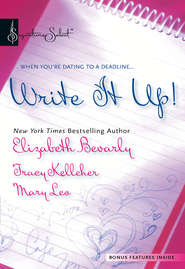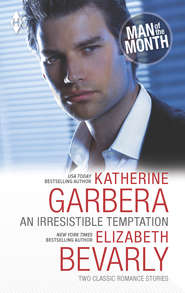По всем вопросам обращайтесь на: info@litportal.ru
(©) 2003-2024.
✖
Undercover with the Mob
Автор
Год написания книги
2018
Настройки чтения
Размер шрифта
Высота строк
Поля
2
“WELL, HELLO AGAIN.” The words came out sounding far more casual than Natalie felt. After all, the last person she had expected to run into at the Speed Art Museum was her new downstairs neighbor, Jack “The Alleged” Miller. But there he was, in all his…darkness…standing right behind her when she turned away from the Raphael to enjoy the Titian.
But she enjoyed seeing Jack even more. And not just because of the way his black jeans so lovingly outlined his sturdy thighs and taut tushe, either. Or because of the way his black leather motorcycle jacket hung open over a black T-shirt stretched tight across his expansive chest. Or because his overly long black hair was once again pushed back from his face in a way that made Natalie itch to run her fingers through it. Or because of the odd frisson of heat that exploded in her belly and shot out to every extremity, electrifying her, dizzying her, making her feel breathless and reckless, as if she were on the verge of an extremely satisfying—
Ah…never mind. She just enjoyed seeing him because…because…Well, just because, that was all. And it was an excellent reason, too, by golly.
Despite both her and Mrs. Klosterman’s misgivings about the man’s name, in the week that had passed since her new neighbor had moved in, Natalie had come to think of him as Jack. She had been able to do this because over the course of the week, she’d run into him a few times and whenever she’d greeted him as “Mr. Miller,” he’d always insisted she call him “Jack, please. Mr. Miller is my pop’s name.”
At first, it hadn’t felt right to call him that, and not just because, in spite of telling herself she was silly for doubting him, she really did find herself doubting it was his real name. But, too, he just didn’t seem like the sort of man with whom one would share such intimacies like first names. If anything, he seemed the sort of man who would prefer to go by his last name, if any name at all. But “Miller” didn’t suit him, either. Had his last name been something like Devlin or Steed or Deacon—or even Mancuso—that would have worked. Miller just seemed too…normal. Too common. Too bland. Not that Jack seemed appropriate either, but she had to call him something. Something other than “The Mobster Who Lives on the Second Floor” at any rate, which was how Mrs. Klosterman continued to refer to him.
Natalie, however, still wasn’t convinced of Jack’s, ah, connections. For lack of a better word. Even if she had heard faint strains of Don Giovanni coming up through the floor a few times—it wasn’t like it was the theme from The Godfather. And even if the faint scent of garlic always did linger around his door—lots of people cooked with garlic, Natalie included, and it wasn’t like he reeked of pesto and Aqua Velva. And even if she had seen him toting a bottle of Chianti up the stairs one day when he was bringing in his groceries—maybe he was just planning to make one of those interesting candles out of it. None of that proved anything. Except that he liked Italian food and opera music and that he maybe had a hobby that included hot wax.
He hardly ever used the word whacked as far as Natalie could tell. And not once had she seen him dragging suspiciously heavy black plastic garbage bags out to the Dumpster under cover of darkness. So that was a definite plus. And he’d worn a suit once or twice, too, she’d noticed. Boring, bland suits, too, and they weren’t always black. And he wore them with neckties that were tasteful. Silk, even. And the toes of his shoes weren’t quite as pointy as she’d first thought, and they might have been made someplace other than Italy, possibly even with man-made uppers. So there. Take that, Mrs. “I-know-a-mobster-when-I-see-one” Klosterman.
And now here he was, viewing a visiting art exhibit at the Speed Museum. Totally, totally non-Mob activity, that. Even if he did seem to be preoccupied by the Italian masters.
He appeared to be as surprised to see her as she was to see him, and suddenly, Natalie wished she’d worn something other than the flowing, flowered skirt in shades of fall, and the oversized amber sweater that came down over her fanny. She had thought the outfit feminine and comfortable when she purchased it. Now, though, it just felt frumpy. Jack Miller seemed like the kind of man who went for tight and sleek and bright, and, quite possibly, latex. Not that Natalie cared, mind you. But she did wish she had worn something different. The hiking boots, especially, seemed inappropriate somehow.
“Well, hello to you, too, neighbor,” Jack said in a deep, rough baritone that belied the Mr. Rogers sentiment. “What’s a nice girl like you doing in a place like this?”
Natalie looked first left, then right, then back at Jack. “It’s an art museum,” she pointed out. “It’s a nice place.”
He smiled at that. “So it is,” he agreed. “I stand corrected.”
She wasn’t sure what he meant by that, so she pressed onward. “So you’re an art lover, are you?”
He nodded, and fiddled with the program he’d already twisted into a misshapen lump of paper. Vaguely, she wondered what had made him do such a thing. It was as if he were anxious about something. But what was there to feel anxious about in an art museum? This was where people came to escape the pressures of the day.
“Yeah, I like art okay,” he said.
But something in his voice suggested just the opposite. He seemed uncomfortable here somehow. Or maybe he was uncomfortable because he’d seen Natalie here. Maybe he was trying to keep a low profile—that was what people did when they were in the Witness Protection Program, right?—and now he was scared that if Natalie had fingered him, the Mob might, too.
Because, hey, it was common knowledge that mobsters hung out in art museums, she told herself wryly, wanting to smack herself upside the head for her Mrs. Klosterman-like thoughts. If Jack was uncomfortable, it was more likely because she’d made him feel uncomfortable by asking him what she just had. Maybe he was here because he wanted to learn more about art, and he was embarrassed to let her know how unschooled he was on the topic.
She opened her mouth to change the subject—she did, after all, completely sympathize with that whole being-out-of-one’s element thing, since she’d felt out of her element since the day she was born—but he started to talk again before she had a chance.
“Yeah, I especially like the Italian masters,” he said.
But again, he seemed uneasy when he spoke, and instead of looking at Natalie, he was looking at something over her shoulder, as if he couldn’t quite meet her gaze. Oh, jeez, she really had caught him out with her question and embarrassed him, she realized. The male ego, she thought. It was such a fragile thing.
He was probably only saying the Italian masters were his favorite because he’d glanced down at his hastily rear-ranged program, where it read, in part, The Italian Masters. She told herself to just let the matter drop there. But there was something in his voice when he spoke, something kind of tense, something kind of apprehensive—something kind of suspicious, quite frankly—that gave her pause. And still he was looking over her shoulder, not meeting her eyes, as if he were wishing he was anywhere but here.
To alleviate his distress, Natalie decided to step in and take the lead, thereby preventing him from having to say anything that might get him in deeper than he could afford. “I like them, too,” she said. “Especially Michelangelo, but we don’t have any originals by him here, which is a real shame.”
Jack lifted his shoulder and dropped it again in a gesture she supposed was meant to be a shrug. Somehow, though, it came off looking like strong-arming. “I like all of ’em,” he told her.
Of course he did. Poor guy. He was still trying to make her think he was knowledgeable about the subject, clearly trying to preserve his male pride. Next he’d be telling her he didn’t know much about art, but he knew what he liked, since that was the cliché everyone uttered in a situation like this.
“It’s kind of funny, really,” he said. “I know a lot about art, but I’m just not sure what I like.”
Man. He couldn’t even get the clichés right.
“Michelangelo is arguably the master of the masters,” he said. “I mean, I wouldn’t argue it, but some people might. Like you, he’s a favorite for a lot of people.”
Natalie wondered just how deeply he was going to wade into this stuff, and prepared herself to throw him a line if that became necessary by tossing out a few other names to him. Raphael, perhaps, or, Titian, since she’d just been looking at that one herself.
“Raphael, too,” he continued, making her think maybe he’d read his program a little better than she’d first suspected. “Even if he did borrow nearly all of the Big M’s repertory gestures and poses,” he continued, rattling Natalie just the tiniest bit. “He was still a better portraitist. Me, though, I’m more of a Titian kind of guy, I think. He was just so great at that whole opposing the virtuosity of pigments to the intellectual sophistication thing, you know? And the distinction between High Renaissance—all that formalized and classic balance of elements—and Late Renaissance—the more subjective, emotional stuff, not to mention all those bright colors—wasn’t as sharply divided in Venice as it was in the rest of Italy.” He nodded. “Yeah, I like the Venetians, I think. And Uccello. You don’t hear much about him, but you gotta admire the way he tried to jibe the Gothic and the Renaissance stuff. Plus, he had a really great beard. Piero della Francesca’s okay, too, but his portraits have kind of a pedantry without compassion, knowwuddamean?”
Natalie blinked a few times, as if a too-bright flash had gone off right in her face. Wow. He really did know a lot about art. And he really didn’t know what he liked. She was intrigued.
“I, um, I actually prefer the Flemish painters myself,” she said lamely.
Jack swept a hand carelessly in front of himself. “Yeah, well, they were all profoundly influenced by the Italians, you know.”
She did know. But not nearly as well as he did. “So,” she began again, “you come here often?”
That something over her shoulder seemed to catch his eye again, because he suddenly glanced to the left and frowned. As Natalie began to turn around to see what was going on, Jack quickly shifted his body into that direction, taking a few steps forward, as if he wanted to block whatever she was attempting to see. Then he said, “This is my first visit to the museum. What else do you recommend I see?”
So Natalie stopped turning. But it wasn’t his question that halted her. It was the way he extended his hand and curled his fingers around her upper arm and pulled her toward the right, as if he were trying to physically regain her attention, too. And boy, did he. Regain her attention, she meant. Physically, she meant. Because the minute his fingers curled around her arm, another shiver of electricity shimmied through her, right to her fingertips, and another wash of heat splashed through her belly with all the force of white-water rapids.
Jack seemed to feel it, too, because he stopped looking over her shoulder and fixed his gaze on her face, and his eyes went wide in astonishment. Or maybe alarm. Or panic. Natalie couldn’t be sure, because she was too busy feeling all those things herself. And more. Desire. Need. Wanting. Hunger. Yes, she thought she could safely say now what it was like to hunger for something. Someone. Because that was how Jack Miller made her feel when he touched her the way he did.
“I, ah…” she began eloquently.
“Um, I…” he chorused at the same time.
“Gotta go,” they both said as one.
And, just like that, they turned around and sped off in opposite directions.
And as she fled, all Natalie could think was that, for a mobster, he had a very gentle touch. Not to mention exceptionally good taste in art.
JACK WAS KEEPING a close eye on his objective when he ran into Natalie in the art museum a second time. Or, rather, almost ran into her a second time. Fortunately, he saw her before she saw him, so he was able to duck behind a sculpture before any damage had been done.
Damn. So much for staying out of her way.
This was just great, he thought as he pressed his body against the cool stone statue. Now there were two people he had to keep an eye on in this crowd. What was bad was that he would have much rather kept his eye on Natalie than on his objective. What was worse was that his eye wasn’t the only body part he was thinking about when it came to keeping something on Natalie.
But he was obligated, even honor bound, to make the man in the trench coat who was studying the Matisse his priority. Because he was the person Jack had been assigned to take care of—so to speak. Not that there was any real care in what Jack was supposed to do to the man in the trench coat who was studying the Matisse. But he did have a job to do—and there was sort of an art to that job, he reflected—and until he could complete that job, he had to stay focused on it. Even if it was a job he didn’t particularly relish completing. Especially now that Natalie Dorset was lurking around.
Lurking, he echoed to himself. Yeah, right. If there was anyone lurking these days, it was Jack. When had he been reduced to such a thing? he asked himself irritably. And why, suddenly, did his job seem kind of sordid and tawdry? He’d always taken pride in his work before. Before Natalie Dorset had come along looking all squeaky-clean and dewy and wholesome. Ever since meeting her, Jack had felt sinister in the extreme. Which made no sense, because what he did for a living was a highly regarded tradition in his family. His father, his father’s father, his father’s father’s father back in the old country, all of them had been in the same line of work. Jack respected his heritage, and had always taken pride in his birthright. Since meeting Natalie, though, his heritage seemed almost tarnished somehow.
Which really made no sense at all, because he barely knew the woman. Yeah, sure, he’d run into her a few times this week, so he knew her a little. Like, he knew she left for work everyday at 7:30 a.m. on the dot, which meant she was punctual. And he knew she often ate breakfast and dinner with their landlady, Mrs. Klosterman, which made him think she was one of those women who felt obligated to take care of other people. And he knew she drove an old Volkswagen, to which she seemed totally suited, because it was kind of funky, and so was she. Not just because of the singing pajamas she’d been wearing that first morning he met her, but because of the way she dressed at other times, too. Like, for instance, oh, he didn’t know…today. She was sort of a combination of Ralph Lauren and Fishin’ with Orlando. And somehow, on Natalie, it worked.
And Jack knew she taught high school, because he’d seen her downstairs grading papers one evening and asked her about it. A high school teacher, he reflected again. She didn’t seem the type. Hell, where he’d gone to high school in Brooklyn, a teacher who looked like her wouldn’t have lasted through lunch. Jeez, she would have been lunch for some of the guys he’d run around with. But she’d claimed to actually enjoy teaching English to teenagers. She’d assigned James Fenimore Cooper on purpose.
And Jack knew she liked old movies, because he’d come in a couple of nights to find her and Mrs. Klosterman watching movies on TV, black-and-white jobs from the forties. Cary Grant, he’d heard them talking about as he’d climbed the stairs to his apartment. The suave, debonair, tuxedoed type. The leading man type. The type Jack most certainly was not. He preferred to think of himself as more of an antihero. Okay, so maybe he was more anti- than he was hero sometimes. That was beside the point. The point was…











